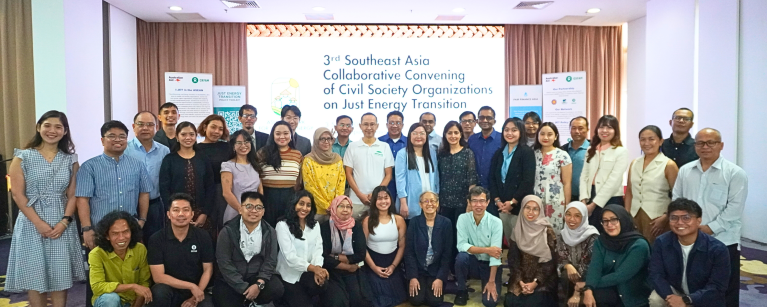“We, civil society organization (CSO) representatives gathered at the “3rd Southeast Asia Collaborative Convening of Civil Society Organizations on Just Energy Transition” in Kuala Lumpur, Malaysia, extend our support to the Association of Southeast Asian Nations (ASEAN), its Member States, and stakeholder groups in urgently setting ambitious targets that will enable the scaling up of support and financing for gender-just and inclusive energy transition across the region.
For this purpose, we propose the following for the consideration of the 43rd ASEAN Ministers of Energy Meeting (AMEM) in the development of the ASEAN Plan of Action for Energy Cooperation (APAEC) 2026-2030:
1. Includeanequitableandsector-drivengender-justandinclusiveenergytransition as a pillar of APAEC 2026-2030;
- Enableandassuretransparent,substantial,andmeaningfulinclusionand participation of Indigenous Peoples, impacted communities, youth, people living with disabilities, women, and women’s rights organizations (WROs), other marginalized groups, and CSOs in contributing to the development and monitoring the implementation of APAEC 2026-2030 with the aim of enabling cross- collaboration among various stakeholders;
- Prioritizeenergysecurityandequitableaccessforallandaddressthepersistent gender disparity in the energy sector through a transformative gender-just transition;
- Ensurealignmentwithglobalcommitmentsbyurgingmemberstatestoreflect gender-just and inclusive energy transition principles in their respective Nationally Determined Contributions (NDCs), Long-Term Low Emission Development Strategies, and National Adaptation Plans (NAPs) that will then inform APAEC 2026- 2030;
- Urgefinancialinstitutionsandinvestorstoscaleupandacceleratetheredirection of finance from fossil fuels to renewable and gender-just and inclusive energy transition, and to provide substantial support and access to finance for community- led sustainable renewable energy solutions and transition programs for Indigenous Peoples, impacted communities, youth, women, and other marginalized groups;
- Enhancesafeguarding,transparency,andaccountabilityintheprocessofagender- just and inclusive energy transition and mining of critical minerals; and ensure a transparent and accountable monitoring system in tracking the progress of
the transition. - Ensurethatfinancialinstitutionsandinvestorsfinancingandprovidingtechnical support for the region’s energy transition, particularly in transition/critical minerals mining value chains, comply with international climate, human rights, environmental rights, and gender-transformative frameworks; abide by the highest standards in accountability, including the development, implementation, and compliance of robust safeguards and grievance and remedy mechanisms; respect the Free, Prior, and Informed Consent (FPIC) of local communities; and engage in transparent and meaningful consultation with project-a\ected communities and CSOs.
- Urgeitsmemberstatesinencouragingthedeliveryoftime-boundcommitments towards realizing the ASEAN’s collective aspiration of net-zero emission by 2050.
- TheAPAEC2026-2030shouldbealignedwithASEANRegionalPolicyFrameworks and Instruments such as the ASEAN Climate Change Strategic Action Plan and the ASEAN Renewable Energy-Gender Roadmap.
To this end, we, CSOs from across the ASEAN, oWer our support to the ASEAN and its member states in enabling a gender-just and inclusive energy transition in the region through the generation of evidence-based research on promoting responsible financing pathways, transparency and accountability, rights-based policies, and just and inclusive energy transition indicators; mainstreaming gender equality, disability, and social inclusion in national energy planning; facilitating social dialogues and supporting the participation of marginalized groups; supporting, demonstrating, and promoting sustainable and renewable energy solutions that are community-owned, youth, and women-led; and creating an enabling environment for financial institutions and investors to accelerate and scale up financing for a gender-just and inclusive energy transition, while preventing and mitigating social and environmental impacts, particularly in the transition/critical minerals value chains.
For us to eWectively contribute, ASEAN member states should ensure CSOs’ access to transparent and inclusive consultation mechanisms and provide safe spaces that will enable CSOs and communities to substantially and eWectively participate in various levels of policy development and implementation.
We, CSOs across the region, are ready to work with the ASEAN and its member states to pilot, model, and promote community-led sustainable, gender-just, and inclusive transition solutions that will safeguard livelihoods and futures to ensure that no one is left behind.”
